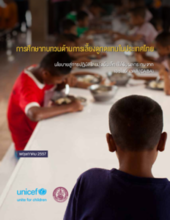The purpose of this research was to capture more accurate and detailed information regarding children in various forms of alternative care in Thailand, as well as the legal, policy, management and oversight environment surrounding them in order to plan and programme more strategically in the area of alternative care, and simultaneously contribute to the global evidence base for international findings and recommendations on alternative care.
The review covered the following types of registered alternative care for children: Residential Care, Foster Care, and Kinship Care.
While the scope of the review focused on all children in alternative care settings, special focused was placed on children affected by HIV and AIDS living in these settings. Providers of care covered through the review included government and private sectors providing residential care, government and privately sponsored foster care, and government supported kinship care. Adoption as a form of alternative care was not reviewed in this study.
Findings and recommendations aim to feed into improved programme and policy environments in the area of alternative care, and contribute to defining work plans for future efforts in this area in Thailand.
It is important to emphasise that this study focused primarily on formal alternative care systems and services in Thailand, although efforts were made whenever possible to collect information about informal and unregistered residential care settings. It was beyond the scope and resources of the study to collect primary data on the informal alternative care settings, specifically informal kinship and foster care.

